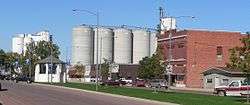Polk, Nebraska
| Polk, Nebraska | |
|---|---|
| Village | |
|
Downtown Polk | |
 Location of Polk, Nebraska | |
| Coordinates: 41°4′34″N 97°47′6″W / 41.07611°N 97.78500°WCoordinates: 41°4′34″N 97°47′6″W / 41.07611°N 97.78500°W | |
| Country | United States |
| State | Nebraska |
| County | Polk |
| Area[1] | |
| • Total | 0.49 sq mi (1.27 km2) |
| • Land | 0.49 sq mi (1.27 km2) |
| • Water | 0 sq mi (0 km2) |
| Elevation | 1,742 ft (531 m) |
| Population (2010)[2] | |
| • Total | 322 |
| • Estimate (2012[3]) | 314 |
| • Density | 657.1/sq mi (253.7/km2) |
| Time zone | Central (CST) (UTC-6) |
| • Summer (DST) | CDT (UTC-5) |
| ZIP code | 68654 |
| Area code(s) | 402 |
| FIPS code | 31-39660[4] |
| GNIS feature ID | 0832297[5] |
Polk is a village in Polk County, Nebraska, United States. The population was 322 at the 2010 census.
History
Polk was platted in 1906 when the railroad was extended to that point.[6]
Geography
Polk is located at 41°4′34″N 97°47′6″W / 41.07611°N 97.78500°W (41.076243, -97.785010).[7]
According to the United States Census Bureau, the village has a total area of 0.49 square miles (1.27 km2), all of it land.[1]
Demographics
| Historical population | |||
|---|---|---|---|
| Census | Pop. | %± | |
| 1910 | 396 | — | |
| 1920 | 561 | 41.7% | |
| 1930 | 532 | −5.2% | |
| 1940 | 493 | −7.3% | |
| 1950 | 508 | 3.0% | |
| 1960 | 433 | −14.8% | |
| 1970 | 413 | −4.6% | |
| 1980 | 440 | 6.5% | |
| 1990 | 345 | −21.6% | |
| 2000 | 322 | −6.7% | |
| 2010 | 322 | 0.0% | |
| Est. 2015 | 304 | [8] | −5.6% |
2010 census
As of the census[2] of 2010, there were 322 people, 152 households, and 91 families residing in the village. The population density was 657.1 inhabitants per square mile (253.7/km2). There were 180 housing units at an average density of 367.3 per square mile (141.8/km2). The racial makeup of the village was 98.4% White, 0.3% Native American, 0.3% Asian, 0.6% from other races, and 0.3% from two or more races. Hispanic or Latino of any race were 2.2% of the population.
There were 152 households of which 21.7% had children under the age of 18 living with them, 51.3% were married couples living together, 5.3% had a female householder with no husband present, 3.3% had a male householder with no wife present, and 40.1% were non-families. 38.2% of all households were made up of individuals and 21.7% had someone living alone who was 65 years of age or older. The average household size was 2.12 and the average family size was 2.78.
The median age in the village was 49 years. 19.9% of residents were under the age of 18; 4.1% were between the ages of 18 and 24; 20.8% were from 25 to 44; 32.9% were from 45 to 64; and 22.4% were 65 years of age or older. The gender makeup of the village was 48.1% male and 51.9% female.
2000 census
As of the census[4] of 2000, there were 322 people, 152 households, and 86 families residing in the village. The population density was 658.4 people per square mile (253.7/km²). There were 190 housing units at an average density of 388.5 per square mile (149.7/km²). The racial makeup of the village was 100.00% White. Hispanic or Latino of any race were 0.62% of the population.
There were 152 households out of which 21.1% had children under the age of 18 living with them, 51.3% were married couples living together, 4.6% had a female householder with no husband present, and 42.8% were non-families. 40.1% of all households were made up of individuals and 26.3% had someone living alone who was 65 years of age or older. The average household size was 2.12 and the average family size was 2.86.
In the village the population was spread out with 19.9% under the age of 18, 4.7% from 18 to 24, 21.7% from 25 to 44, 20.8% from 45 to 64, and 32.9% who were 65 years of age or older. The median age was 47 years. For every 100 females there were 96.3 males. For every 100 females age 18 and over, there were 89.7 males.
As of 2000 the median income for a household in the village was $28,056, and the median income for a family was $38,472. Males had a median income of $26,389 versus $18,500 for females. The per capita income for the village was $15,670. About 4.4% of families and 5.4% of the population were below the poverty line, including 6.2% of those under age 18 and 8.4% of those age 65 or over.
References
- 1 2 "US Gazetteer files 2010". United States Census Bureau. Retrieved 2012-06-24.
- 1 2 "American FactFinder". United States Census Bureau. Retrieved 2012-06-24.
- ↑ "Population Estimates". United States Census Bureau. Retrieved 2013-05-29.
- 1 2 "American FactFinder". United States Census Bureau. Retrieved 2008-01-31.
- ↑ "US Board on Geographic Names". United States Geological Survey. 2007-10-25. Retrieved 2008-01-31.
- ↑ "Polk, Polk County". Center for Advanced Land Management Information Technologies. University of Nebraska. Retrieved 22 August 2014.
- ↑ "US Gazetteer files: 2010, 2000, and 1990". United States Census Bureau. 2011-02-12. Retrieved 2011-04-23.
- ↑ "Annual Estimates of the Resident Population for Incorporated Places: April 1, 2010 to July 1, 2015". Retrieved July 2, 2016.
- ↑ "Census of Population and Housing". Census.gov. Retrieved June 4, 2015.
